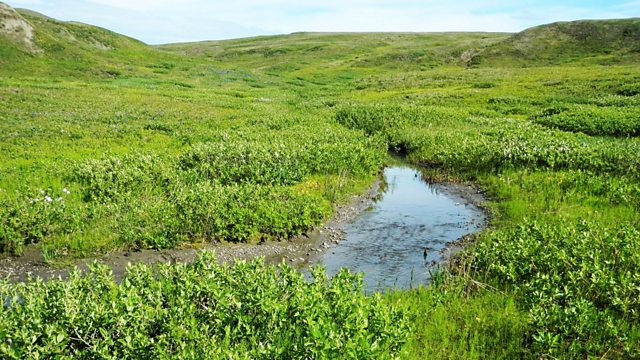
Global Warming and the Arctic Tundra
How global warming is affecting Arctic tundra and how it could be adding to the problem
An international team of scientists, led by the University of Edinburgh, has carried out one of the biggest ever studies of key vegetation in the Arctic tundra. It found "strong evidence" that "dramatic" changes in the region are being driven by climate warming, researchers said. Tundra shrubs, which act as a barometer of the Arctic environment, were found to grow more when temperatures are warmer. But the study also suggested that increased shrub growth, driven by recent and future warming in the Arctic, could cause further warming in the area and the planet as a whole. Taller shrubs can prevent snow from reflecting heat from the sun back into space, warming the Earth"s surface. They can also influence soil temperatures and thaw permafrost.
Air craft noise
Commercial aircraft have got significantly quieter in the last few decades, as jet engines have evolved. This hasn’t stopped aircraft noise becoming a major issue, both in terms of health but also politically, with communities world-wide, as airport expansion continues and the number of flights increases.
Nuclear Fusion
For decades scientists have tried to harness the power of the Sun to smash atomic nuclei together to create a clean, limitless energy source from nuclear fusion. Marnie Chesterton talks to scientists from Tokomak energy about their new design for a Tokomak machine that has already exceeded previous records. Could it be a vital step forward in the quest for nuclear fusion on Earth?
Sleep and trauma
As well as allowing the body and the mind to recuperate, sleep plays a part in allowing us to consolidate our memories, particularly emotional ones. However after a traumatic event, we might wish we could remember what happened without the feelings of terror or panic that might accompany it. So researchers at Oxford University’s Nuffield Department of Clinical Neurosciences had an idea; what would happen if you showed people something traumatic and then stopped them going to sleep in order to disrupt the way people feel about their memories? Could this help prevent post-traumatic stress disorder? Dr Kate Porcheret is one of the co-authors of the study, which has just been published in the journal Sleep.
The Sounds of Space 2
Last week on the Science Hour , astronomer Lucie Green took listeners on a sonic tour of the Solar System, through the 'gas giants' of Jupiter and Saturn, culminating with radar signals from the furthest landing ever attempted by humans, onto the orange moon of Titan. This week, that tour continues, venturing out into deep space, beginning with the sound we humans sent out into the cosmos on the Voyager Space craft, carrying astronomer Carl Sagan’s message to alien civilisations.
Ice cores
One of our best ways of understanding how the climate is changing, is with the help of historical records locked up in ice cores. The deeper you drill through old ice, the further back in time you go, as it’s deposited year on year on year. It turns out keeping these samples from defrosting is not an easy engineering challenge though. Next year, scientists from around the world will start to place glacial ice core samples from across the world in a vault in Antarctica, an underground ice tunnel near the Concordia Research Station. Marnie Chesterton investigates.
Science Hour was presented by Jack Stewart with comments from Jonathan Webb.
Producer: Rami Tzabar
(Photo caption: Tundra on Qikiqtaruk-Herschel Island on the Arctic coast of the Yukon Territory Β© Isla Myers-Smith/PA Wire)
Last on
More episodes
Previous
Next
Broadcasts
- Sat 11 Jul 2015 16:05GMTΒι¶ΉΤΌΕΔ World Service Online
- Sat 11 Jul 2015 21:05GMTΒι¶ΉΤΌΕΔ World Service Online
- Sun 12 Jul 2015 10:05GMTΒι¶ΉΤΌΕΔ World Service Online
Podcast
-
![]()
Unexpected Elements
The news you know, the science you don't

